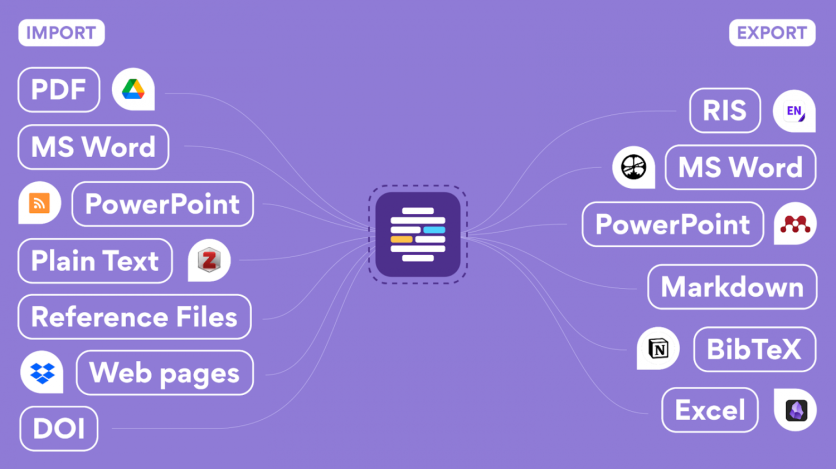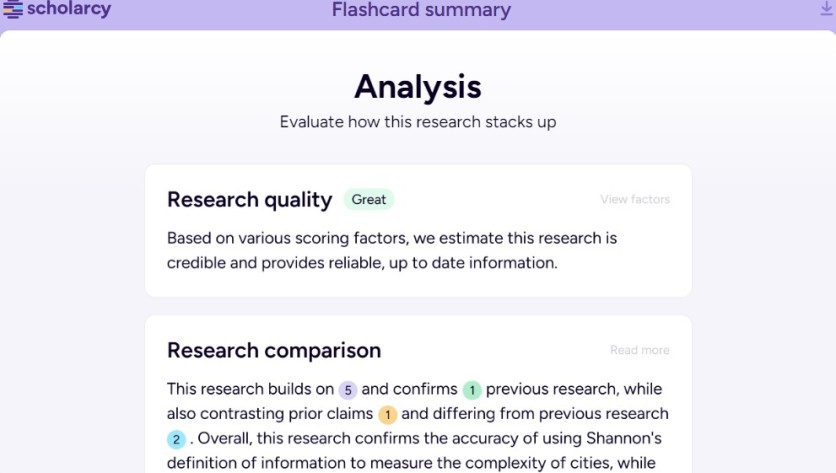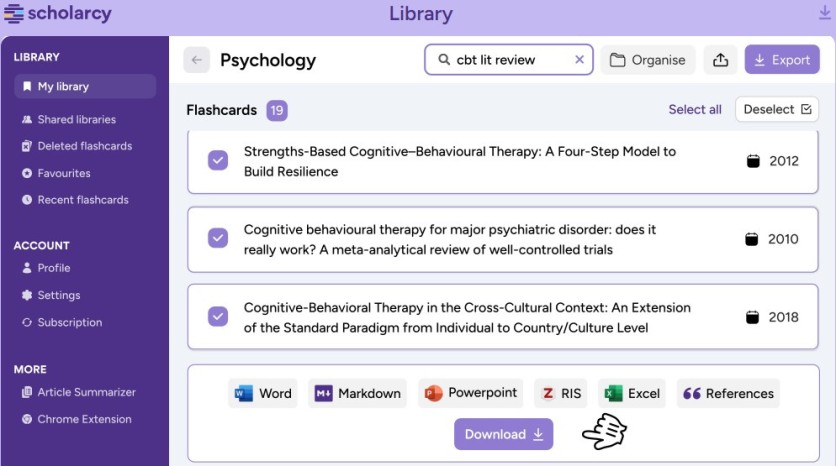
Scholarcy uses artificial intelligence (AI) to help students and researchers get an easy-to-read, informed overview of research papers and other long-form articles. It offers a range of features that help users analyse and evaluate more complex texts and gives them the tools to build and reinforce their knowledge of a subject.
The platform is used by advanced students and researchers worldwide to efficiently screen collections of articles for key information. By structuring the text in a more accessible way, highlighting important points, providing a customisable summary and displaying research quality indicators, it helps users determine which articles will be most useful to their research. Users can also gain deeper insight through clear comparisons with earlier work and handy snposhots of cited sources.
Undergraduate and neurodivergent students also rely on Scholarcy to keep on top of their course reading. The consistent flashcard format it generates from any PDF, online article, or even video transcript, takes away the cognitive load associated with processing lots of information from different sources and puts students more in control of their learning.
Scholarcy's structured summary gives users a reliable, easy-to-read overview of papers and the Enhance option can be used to explain the paper in a way that the reader understands by adjusting the style and length of the summary.
Consistent interactive Flashcards minimise context switching and help readers stay focused. Users can also generate an instant, annotated bibliography as a starting point for their literature review. Scholarcy integrates with other research apps, including reference managers and knowledge networks, so that users can import articles from a range of sources and visualise the contents of their flashcards in the way that works best for them.
There's a free version of Scholarcy available, with the option to upgrade to Premium for $9.99 per month or $90 per year. A subscription lets you import unlimited articles, build a structured library of Flashcards that you can refer back to at any time or export to a range of formats for further analysis.
Let's take a closer look at its features and how they can help you confidently build your knowledge on any subject:
AI Generated Structured Summary
Scholarcy is able to accurately and reliably summarize text in any format. You can adjust your summary by choosing the reading level that best suits you, including: general reader, undergrad level, researcher, bulleted list, and more. The summary is generated from the original text to ensure that everything you read can be traced back to the original document. Generative AI is used to adjust the style of the summary but this is based on an extracted summary to ensure accuracy.
The Key findings section gives you a condensed list of important points from the paper, to help you identify how useful it is, and you can click on these to jump straigh to the corresponding section in the full text of the article.
Step by Step Guidance through the Text
Scholarcy provides a lot more beyond summarisation. It essentially changes the way readers approach complex texts by making them more accessible, decoding the language used, and presenting information in bite-size sections.
The new navigation structures papers into three sections: Summary, Analysis, and Original text. Jump to a summary of the conclusion and get straight back to the key findings without all the scrolling. Users can also dive straight into the detail of the text by clicking on any of the Original text links in the navigation.
With Scholarcy's new Dig Deeper feature, users can find out more about the text by asking a question or writing a short prompt (e.g. How were the study participants selected for this study?)

You can also add your own notes and export these with your flashcards to a range of formats including Word, PowerPoint and Excel. Building up and organising your library of flashcards makes refreshing your memory on any text quick and easy. You can also use summaries and key findings to kickstart your lit review, structure your dissertation, or help with revision.
Analyse and Evaluate Research with Confidence
Scholarcy can help you evaluate the importance and validity of any academic text with its new Analysis section. This gives you more context on the paper including: research quality, research comparison, study limitations, future research directions & practical applications. It rates the text across a number of research quality indicators to determine if it's great, fair, or weak to give you greater confidence in the research you read and cite.

You can use Scholarcy to understand how your document compares to earlier research in the field. Its Research Comparison feature pinpoints where in the text the authors build on previous claims and findings or differ from them. You can also generate a quick summary of the cited source or link straight to the full text to validate it, expanding your knowledge and helping you build a literature review. Scholarcy also shows you how many times a cited source has been supported or refuted, through its Scite.ai integration.
Knowledge Management
Scholarcy lets you save and organise your Flashcards into a personal library. Within each library, you can create folders for subjects, topics, or subtopics and easily sort these or search by title, author, or keyword. You can also search across millions of Open Access articles directly from within Scholarcy and import these to your library as flashcards.

Scholarcy provides a virtual environment where users can easily store and access research, expand their knowledge and develop new ideas.
Pros and Cons
Pros
- Fast and easy to use
- Generates reliable, accurate summaries
- Provides deeper insight with analysis and evaluation features
- Fully-formatted bibliographies in one click
Cons
- Some features are exclusive to the premium (paid) version of Scholarcy.
- Requires internet connection
Conclusion
Scholarcy utilizes natural language processing and machine learning algorithms to analyze any uploaded text and generate easy-to-understand structured digests. It speeds up knowledge building and helps students and researchers make more informed evaluations of the literature in less time.
Want to improve your reading and research more productive? Sign up for the 7-day free trial and find out how Scholarcy can help you.
ⓒ 2025 TECHTIMES.com All rights reserved. Do not reproduce without permission.





